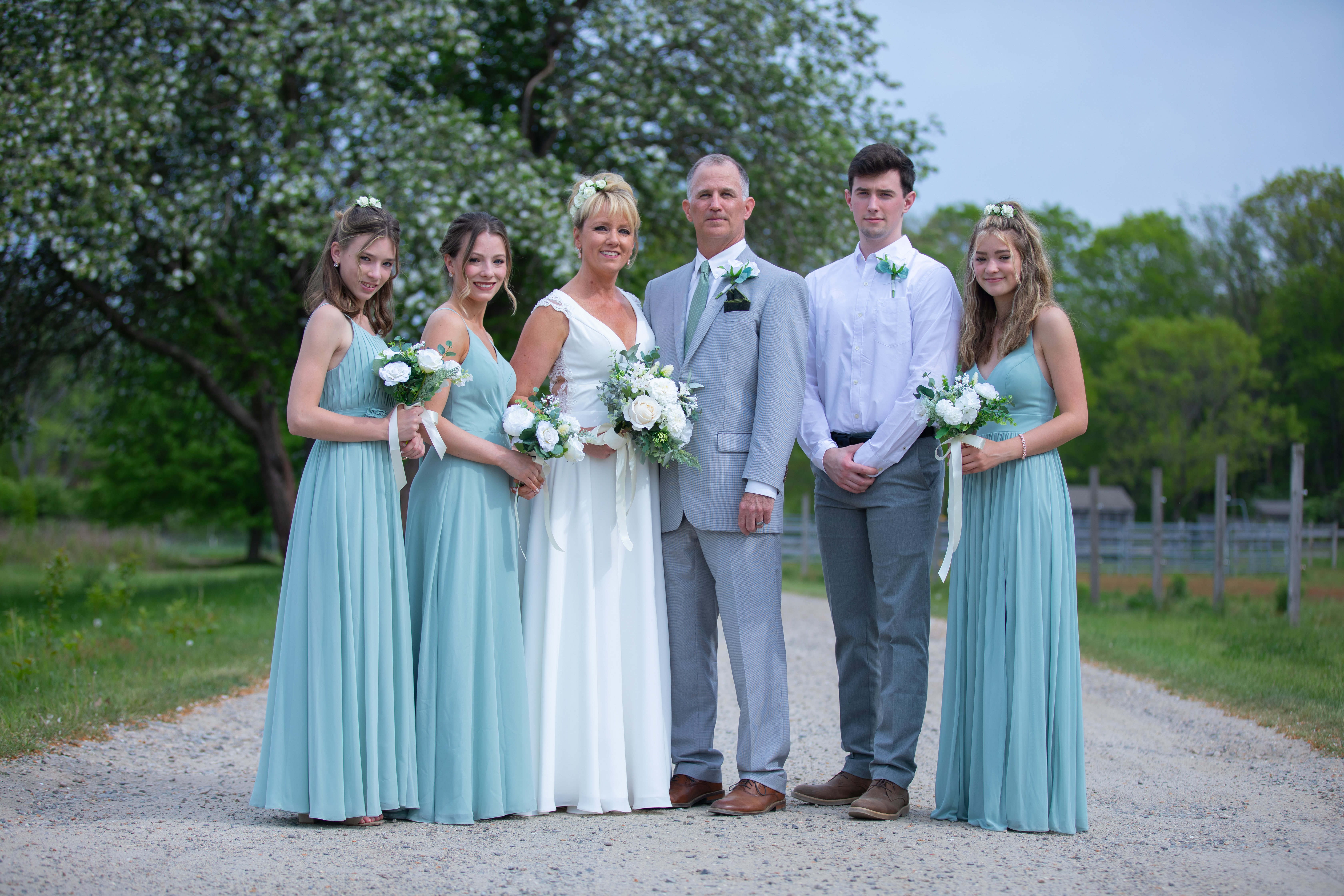Christie Hines: Survivor
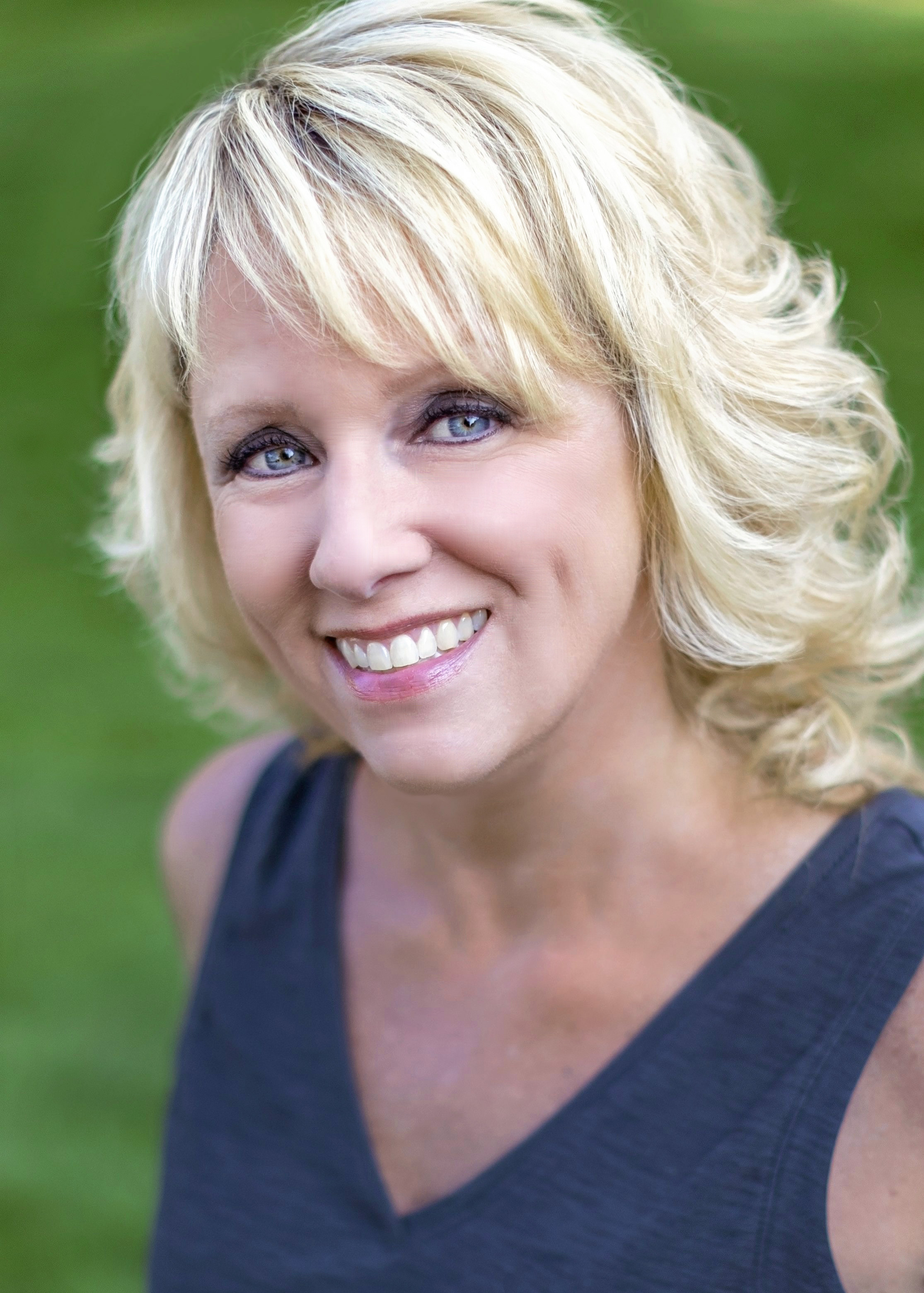
“The nurse had given me a couple of books that were written by children who had moms that had had breast cancer. So, one night, in the evening, everything was calm in the house. I said, ‘let's look at some books’, and I sat down with them and read them the books. And I mean, my eyes were just filling up with tears, trying to read this to them because I was so sad that I had to tell them this."
Christie Hines describes her life before cancer as “pretty basic”. From the outside looking in, you might agree with her. Nine years ago, her mornings were spent getting her children ready for school, her afternoons were spent at work, and come evening time - she was back home helping her kids with homework. But under the surface, Christie was a single mother to three daughters. Her oldest was a freshman in college, and her younger daughters were eight and five. Christie was coming off a bad divorce and doing everything she could to shield her children from the aftermath, while also working to avoid losing the house. At her core, Christie is a fast-paced go-getter who is not easily knocked off course. In her words, “getting a cancer diagnosis was definitely not a part of my plan.” So, when the call came, she handled it the only way she knew how.
“It was Valentine's Day 2013 when the nurse at the Breast Care Center called me up and said, ‘Can you come in?’ And I, at that point, I thought, OK, if this was good news, she could tell me that on the phone, so I called my then boyfriend. He and I had been together a long time. He came down and we went. We got there and I looked at her and I said, ‘Just say it’”
Five months earlier, Christie noticed a lump in her breast during a self-breast exam; something that she admits she did “once in a blue moon.”
“It didn't take much to find that first lump. I mean, I didn't even have to really press. It was about the size of frozen pea and it hurt to the touch, so I immediately went to my OB’s office. I wasn't able to see my regular doctor, but another doctor examined me and sent me for a mammogram. The mammogram did not show anything at all even though it was clearly there. I met with the breast cancer specialist and she examined me. She called it a fibrocystic mass that had just sort of ‘plunked itself’ there. She said ‘that can happen, it will probably will go away on its own, but we'll check it again in three months’. So, the end of that year, December 2012, on the morning of my re-check, I found a second one below the first. Same exact thing. So, I went in to see the breast cancer specialist again. She said, ‘No, they're just little balls of tissue. They'll go away. Nothing to worry about.’ and sent me on my way. I did not feel good about that at all. I felt like something's not right here. Luckily, at the beginning of 2013, I happened to have my annual gynecological exam with my OB, who also is a breast cancer survivor. This was the first time I was able to see her with this, and she examined me. She didn't feel good about what she felt.”
Later that day, Christie was sent in for an ultrasound, which confirmed the presence of lumps. Her doctors then ordered an Ultrasound Guided Breast Biopsy, which uses sound waves to locate abnormalities and removes a tissue sample for examination. On February 14th, 2013, Christie was diagnosed with stage two breast cancer. The biopsies showed that the cancer was invasive, spreading, and that chemotherapy would be necessary.
“The first thing in my head were my kids, because I had been working for years, keeping them safe from their father. It was a bad situation, I had to go through leaps and bounds to keep them safe from him. I felt like, oh my gosh, if I don't make it through this, there's a chance…that was my first thought. We were all crying, the nurse was crying, you know, I was so concerned about my kids. And so, for a couple of days, I was pretty upset. But then I thought, ‘you know what? I'm just going to do this. This is not going to take me out. No way.’ I couldn't imagine leaving them in the world without me because of the situation with their dad. I had pulled them out of it and was protecting them from that. I was just petrified that if something happened to me, it would have been a mess for my family to try to fight that. I'm just like, No way, no way, no way. There's no way I went through all of that for this to take me out. No way.”
The first step for Christie was to tell her three daughters. That weekend, her oldest came home from college to receive the news. For her two younger daughters, the conversation was not as simple.
“I didn't know how to tell them, you know, how do I go about this? So, the nurse had given me a couple of books that were written by children who had moms that had had breast cancer. So, one night, in the evening, everything was calm in the house. I said, ‘let's look at some books’, and I sat down with them and read them the books. And I mean, my eyes were just filling up with tears, trying to read this to them because I was so sad that I had to tell them this. My eight-year-old, she had some concern. My five-year-old at the time, she was like, ‘Mom, are you going to be bald?’ But they were fine because I didn’t want to have a ‘woe is me attitude’, I didn’t want to make them scared, so I made sure to maintain positivity, humor if it was fitting, and just keep things on a positive track.”
Christie’s first round of chemotherapy was on February 28th, 2013 at Maine Center for Cancer Medicine in Biddeford (now called New England Cancer Specialists).
“The chemotherapy really attacked my leg muscles, bad to where I couldn't even walk at points. It was probably by about the third treatment, I was crawling in my house, crawling up stairs. I couldn't walk. It was the strangest thing. My legs were just completely jelly. So, from a mothering standpoint, I wasn't very effective as far as the physical part of it. You know, my mom was at the house all the time. I had people doing all the things that I normally did - laundry, cooking, cleaning, whatever. They all were helping with that because I couldn't physically do anything and I couldn't drive. It's hard too, because I'm a doer by nature. It was hard to lay on the couch and give all that up and have everybody else doing it for you, even though it's what they want to do. It's hard to watch that and say, ‘OK, I've got it. I've got to lay here and I can't do these things, and it's only temporary.’ That’s tough, really tough.”
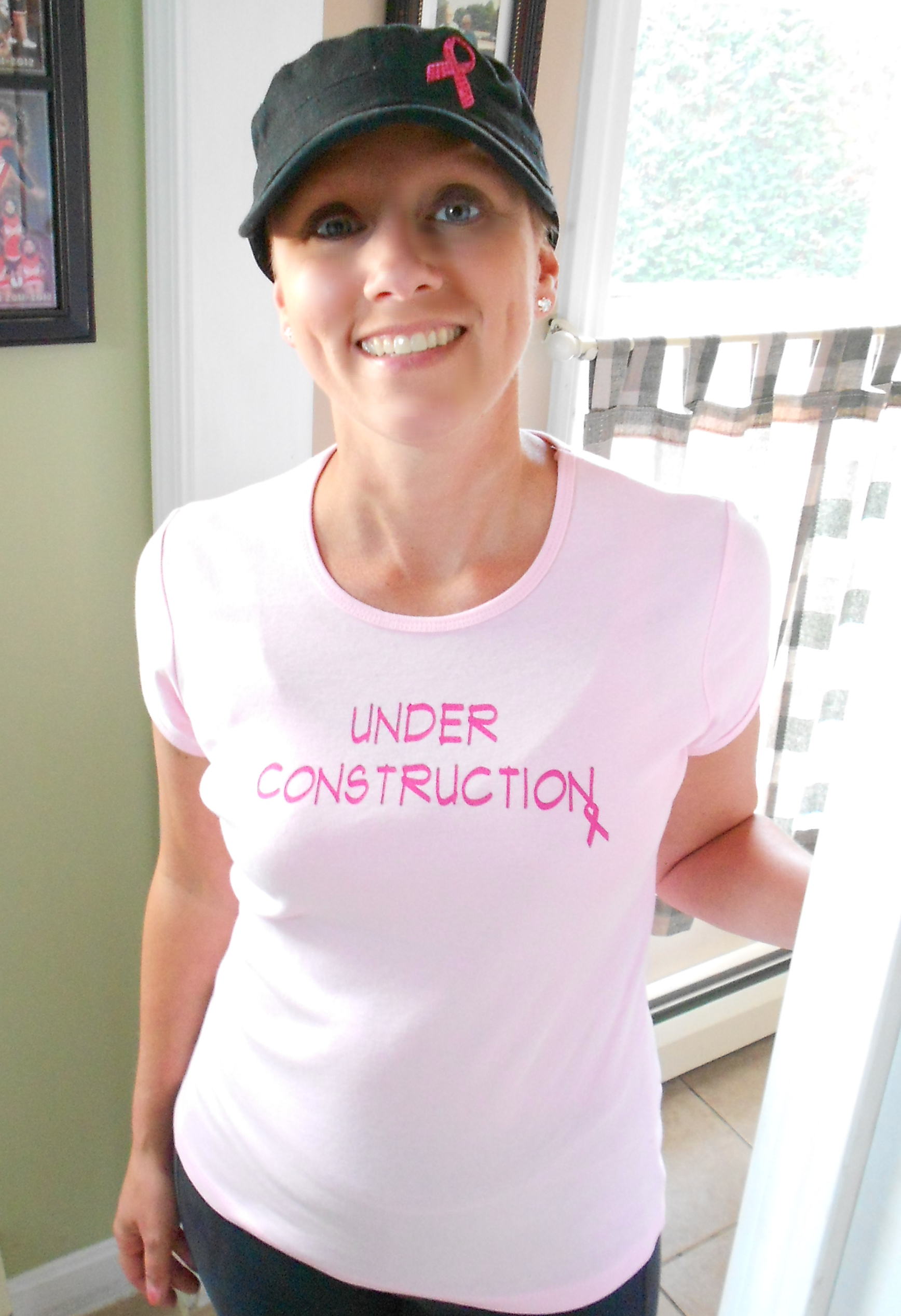
In the midst of her treatment, Christie was fired from her job. As a result, she was unable to continue modifying her mortgage, which ended up costing her their home. With her income cut off, the support Christie received from her friends and family helped her push on.
“They knew my income had been cut off, I was in a financial situation. Bills were still coming in, that sort of thing. So, they were doing these little fundraisers for me. I had a friend that made these really cool breast cancer awareness bracelets, selling them. They were making hair bows and selling them. They basically created an account for me and all the money was going in there. So that way, if I needed to get oil for the house or something, the money was there for me and I didn't have to worry about it. That was totally unexpected. I never imagined people going through that, like people in my community that I didn't even know were contributing to this. I had people showing up at my doorstep with meals and shirts for us and stuff that most people would be like ‘whatever’, but I mean, at the time, those things were important. That blew my mind, that completely blew my mind.”
While these acts of kindness made all the difference for Christie, she reflects on the importance of letting the caregivers do most of the heavy lifting.
“The best thing for family and friends to do is just be of support, and not do anything to stress out the patient and the caregiver. Like I said when I when I was battling my cancer, I had my mom and my then boyfriend and my daughters were my designated caregivers, and everybody else was a support system. There weren’t other people trying to throw in their two cents all the time. I didn't have any of that type of stress going on, but when I served as a caregiver, I did. That was happening, and all it did was make things ten times harder than it needed to be. The last thing you want to do is put stress on somebody who's battling cancer, because that is not helpful to them. Let the caregivers of the patient and the doctors do their thing. Be a support system for them, like a cheering section, cheering them on.”
Despite her two initial misdiagnoses, Christie talks fondly about the level of care she received. To begin her chemotherapy treatments, she needed a Mediport placed under her collarbone, a procedure that she was not entirely sure about. However, Christie was amazed by the extra steps her nurses took to make her comfortable.
“My oncologist, Dr. Ebrahim, was fantastic. He's the one that told me from the get go, ‘we got this, don't worry.’ I remember one of the oncology nurses that I had when I would go to my treatments, Jennifer, she was just the sweetest. I was afraid, I had never had a surgery of any kind before. I was concerned about having the Mediport procedure done. So, she had other patients in the treatment room - who I had met, come over and chat with me about getting it, and the benefits of getting it. Which I did, and having treatments was much more comfortable afterwards than having to have an IV in my arm every time.
She just did all these little extra things to help me out. I remember the very last day that I was in the treatment room, she specifically wore a pink nurse's smock for me because it was my last day there. To me, the nurses are just phenomenal. I love the level that nurses go to; whether it was in the treatment room or with my any of my surgeries that I had. Phenomenal. I had no negatives from the time I was diagnosed through the end, it was about 15 months start to finish. No negatives whatsoever.”
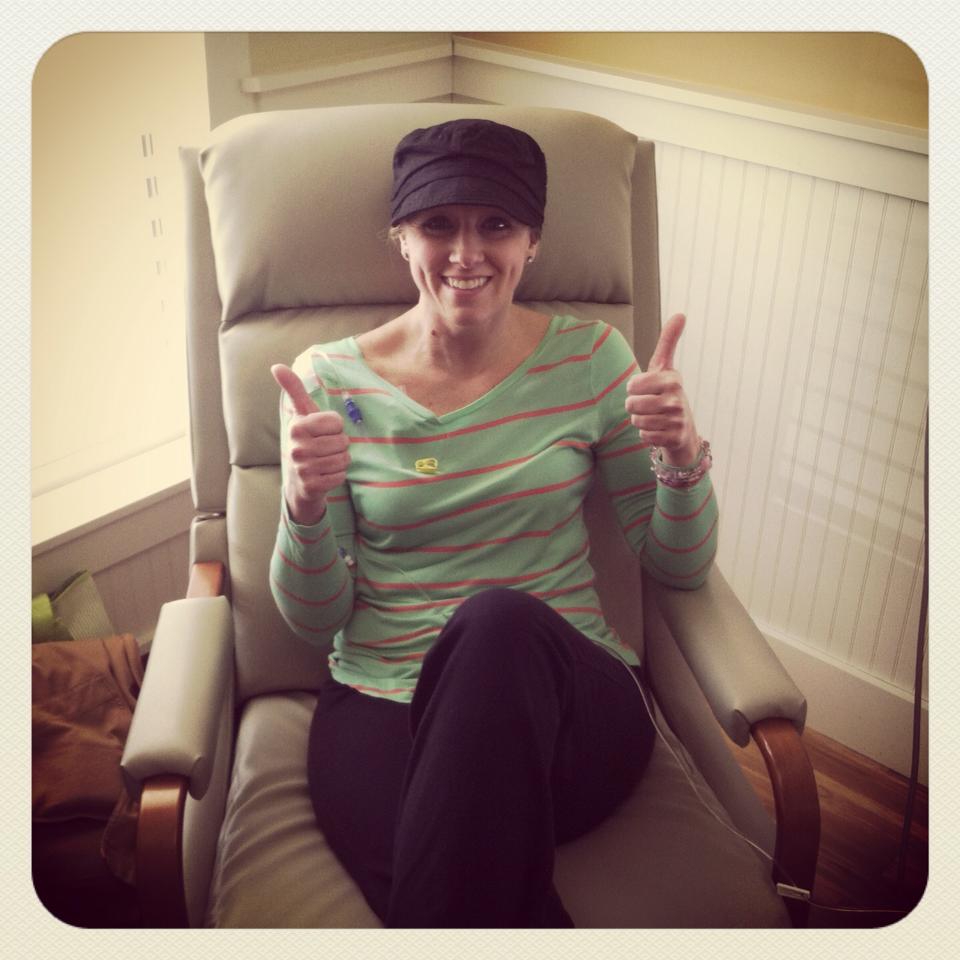
After six rounds of chemotherapy, Christie Hines became a breast cancer survivor in May of 2014. She doesn’t look back at her experience with the resentment and anger that you might expect. Instead, Christie recalls the positives that came from the situation.
“Because of cancer, I became stronger. The interesting thing that happened while I had cancer was I had all these wonderful opportunities handed to me, which I never, ever would have had. It’s weird to think, I got all these great opportunities because I was sick at the time and that wouldn't have even existed, and I've had some of the best experiences in my life because I had cancer. I was selected after being nominated to be the Boston Red Sox honorary Batgirl for their Cancer Awareness Day. It was during my time that I was having chemotherapy. I got selected out of 80 some odd women based on my story and online voting. My family and I, all got to go to Fenway Park and we were down in the dugout and I got to meet David Ortiz. I never would have had that happen to me if I hadn't had cancer, it's just strange to think about that. You know, all the positives that came out of such a negative thing that could have taken my life. The people that I've met because of cancer, I have met so many wonderful, courageous women. Most of the ones I've met have had some level of breast cancer. I know I have met women that did not survive. I met women that I've been friends with now for the last nine years. I have wonderful friendships because of that. We have that common, that sisterhood, the pink sisterhood we call it. I never would have had that. I never would have had these people in my life if I hadn't had breast cancer. And it just baffles me to think.”
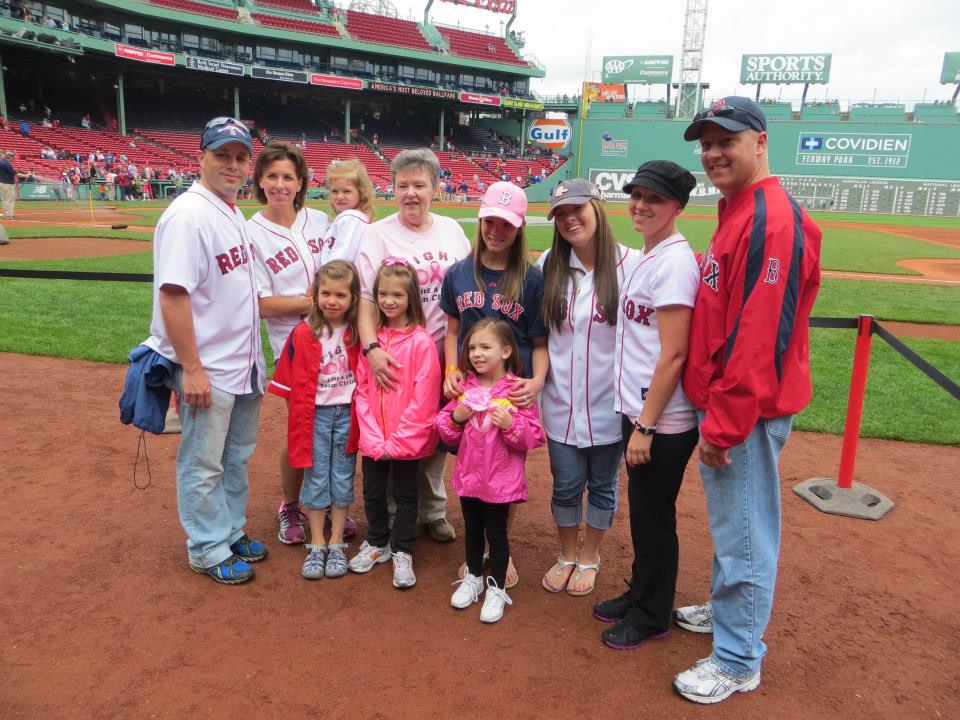
Christie Hines' story is a tale of perseverance, determination, and above all else – a lesson in self-advocacy.
“Do your self-exams. I know a lot of women might feel funny about doing it, you got to let that go. Just do your exams, because had I not done that? Who knows what would have happened? If I had never just happened to do one when I was in the shower one day, who knows what would have happened from there? It’s very important to be proactive in your own health. Do your breast exams and get your mammograms done. If you feel a lump and a mammogram doesn't show it, ask for an ultrasound because that will show it. Just be your own advocate. If the doctor tells you nothing's wrong and you feel like something is, just keep pushing it, keep pushing it, keep pushing it. You know, ultimately, that's what I had to do. Luckily, I wasn't too far advanced by the time we found it.
Doctors can make mistakes. They can be bad mistakes sometimes. And it also taught me that you've got to speak up. You've got to speak up if you're the patient and you have a doctor telling you something, even if you still don't feel right about what they're telling you. Speak up. And thankfully in the sequence of the way things happen for me that it wasn't a long period of time between the second time she told me, ‘you have nothing to worry about’ and then my diagnosis - it was only a matter of a couple of months. Had I not had that OB visit at the beginning of the year, who knows what would have happened?”
Christie shares her story not only for herself, but for others. She hopes that by sharing her story, she can ease the burden on others dealing with a similar experience.
“I love the fact that Maine Cancer Foundation is doing this, I think it's important. I’m just a regular person, I'm not a celebrity. I'm just me, and I feel like I'm representative of regular people, who have regular lives, whose lives come to a complete halt. When this kind of thing happens, they're just living day to day, paying their bills, working, and then boom, everything just comes to a stop because you have to deal with this if you want to survive. I feel like my story isn't that far off from a lot of people and what they've gone through. I love the opportunity to be able to talk about it and share. I feel like sharing sort of takes it off your shoulders a bit, releases it from you a little bit, and at the same time - you might be helping somebody, too."
Now married and living in Falmouth, Christie’s life hasn’t slowed down since her winning battle with cancer. In 2020, she became the Pageant Director for the United States of America’s Maine Pageants, a role that allows her to mentor, empower, and encourage other women to be the best version of themselves. Christie and her pageantry team are routine participants in local fundraising events such as Mary’s Walk, the Dempsey Challenge, and Making Strides Against Breast Cancer.
